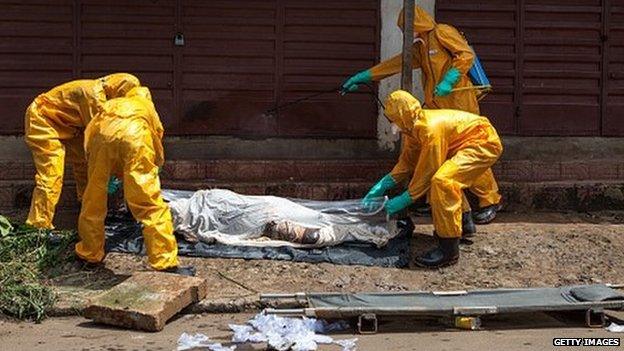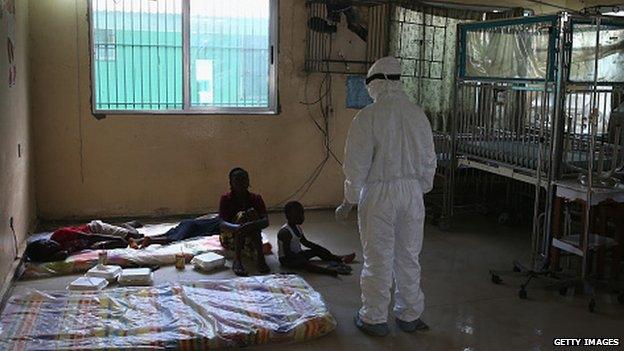Ebola outbreak: How many people have died?
- Published

How many people have died from Ebola in West Africa?
It sounds an easy question, but the answer is certainly not.
The most recent official figure from the World Health Organization puts the number of deaths at 4,493.
But 12,000 could be a better estimate. Getting to this figure highlights a number of issues with the Ebola data.
How many cases?
First of all there is a fair bit of uncertainty about how many people have Ebola.
The ones we know about stand at 8,997 - this is made up of confirmed, suspected and probable cases.
However, Liberia, Sierra Leone and Guinea have some of the worst-funded healthcare systems in the world.
We know people are contracting the disease, and dying from it, without being noticed.
Based on small trials, agencies including the WHO and the US Centers for Disease Control are taking an "educated guess" that the figure is around twice that.
The widely reported estimate of 10,000 cases per week by December uses this doubling to account for under-reporting.
"We get that because 5,000 is the midpoint of our modelling scenarios and if we allow for under-reporting [by a factor of two] then that's 10,000," said Dr Christopher Dye, the director of strategy in the office of the director general at the WHO.
Use the same principle and the number of cases now could be around 18,000.

Ebola holding centre in Monrovia, Liberia
What is the death rate?
Looking at the official figures again - 8,997 cases and 4,493 deaths - you might think that roughly half of patients die.
"This is wrong," Dr Dye told me.
The data is, quite frankly, a bit of a mess.
Take the WHO Ebola response roadmap update on 10 October, external. It has more confirmed deaths in Liberia from Ebola (1,072) than actual cases (943).
This confusing set of figures comes about by collecting data on cases and deaths separately.
Also, comparing current cases and current deaths does not take account of people living with the disease for some time before either dying or recovering.
What you need is quality data and the best comes from a report in the New England Journal of Medicine, external.
A team, including scientists at Imperial College London, looked at a sub-set of patients with full medical records from diagnosis through to either recovery or death.
Dr Dye told the BBC: "On the basis of this analysis, our best estimate is a 60-70% case fatality and it's sensible to use a range as there are variations from one place to another."
Use the 70% figure on the 18,000 estimated cases and it seems around 12,000 are either dead or dying.
Clearly that is not a definitive figure, but getting there shows how messy some of the data are.
And this is the same basic data being used to reach forecasts of 1.4 million cases by January or 10,000 new cases a week by December.